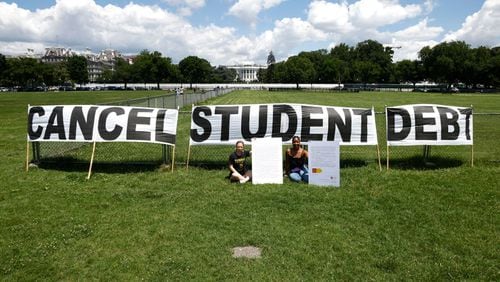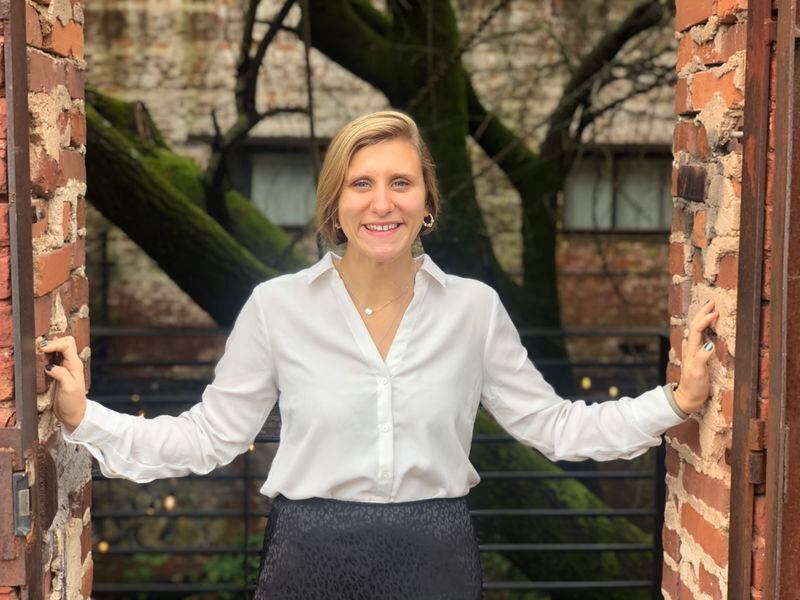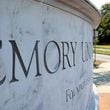Joe Spearing and Kali Thompson are doctoral students at the University of Georgia. Spearing is an economist, and Thompson researches education.
In a guest column, the two applaud the student debt forgiveness plan announced last week by the Biden administration. But they urge the federal government to cancel all student debt in light of how the nation’s leaders pushed young Americans to attend college and assured them the loans were a good investment.
By Joe Spearing and Kali Thompson
Federal student loans were created by Washington, initially because the United States needed more scientists to compete with the Soviet Union. They were repeatedly expanded in order to boost the human capital of the nation’s economy.
Education is “no longer a luxury but a necessity,” President Lyndon Johnson told us in 1965. The Clinton White House complained, “Too few students aim high, graduate from high school and attend college,” and expanded student loans, encouraging more of us to borrow. George W. Bush told us, “Education is how to make sure we’ve got a work force that’s productive and competitive,” further expanding college admissions.
Barack Obama’s White House provided some subsidies for low-income students to go to university, but not enough to cover fees.
The government message has always been clear: Keep borrowing; it’ll be worth it.
We were told that going to college would boost our earnings, granting us economic security. This security was how student debt was justified: comfortably middle-class adults can afford to pay some of their income back, can they not? Our high school guidance counselors told us college would pay.
Credit: Contributed
Credit: Contributed
Many of us were skeptical but, seeing little other choice given the decline in wages for those with no college education, took the risk. With politicians promoting the idea of “college for all,” we did not want to be the only ones without a degree in an increasingly competitive economy.
Washington was wrong.
The generation of students who have graduated in the last 10 years is the most educated in history, but has inherited an economy that cannot support them. The promised economic security has not materialized. The generation who graduated since 2009 has experienced the aftermath of the global financial crisis, painful asset and housing bubbles, and then the COVID-19 crisis.
Credit: Contributed
Credit: Contributed
We have lower earnings, less assets, and lower wealth than previous generations at the same age. Some graduates fare worse than others: those who studied social sciences and education receive only small increments in earnings above those with no college experience. For those graduates, the future is grim, and a lifetime of student loan payments makes it even worse. Washington did this. The least they can do now is cancel the debt. All of it.
Some people say that graduates should simply pay for our mistakes, that a decision made at the age of 18 should define a person’s financial life. The problem with this argument is twofold. Firstly, graduates took on student debt following the advice of our elders and our government, who incorrectly told us these loans and the education they purchased would secure our financial futures. The consequences of extortionate college fees should not fall on us alone. Secondly, student loans are not like other debt, which can be absolved through bankruptcy. Some graduates would take this route if we could.
Since we cannot, Washington must cancel the debt. All of it.
Some might worry that canceling student debt will provide subsidies to high earners. It is true that there are some very high earners with student debt. They have already made significant payments to reduce their outstanding debt. But if the concern remains, there is a solution here: tax those who can afford to pay more. And then help those who cannot by canceling student debt. All of it.
Some might say that debt cancellation targets the wrong issue. Surely, the problem is with the colleges which have offered degrees that do not allow their graduates to access the kind of earnings they promise, and with spiraling tuition fees which are not justified by the product provided? Yes, and Washington should reform this, providing quality control and regulating affordability. But for those whom it is too late to help in this way, they should cancel student debt. All of it.
Some might think that the answer is to provide alternative routes to secure employment. Instead of forcing people to go to college to aspire to well-paying jobs, good employment should be available to all so that people can avoid going to college. This is true. Washington should raise the minimum wage and empower unions. But they should also cancel student debt. All of it.
We are a generation scarred by rising inequality, the global financial crisis, and the mismanagement of the pandemic. We are also a generation experiencing stagnanting wage growth and declining life expectancy, while rent, house prices and the overall cost of living increase beyond our budgets.
The least Washington can do is cancel our student debt. All of it. And if they do not, they had better not come asking for our votes.
The authors of this guest column, Joe Spearing and Kali Thompson, are doctoral students at the University of Georgia.









